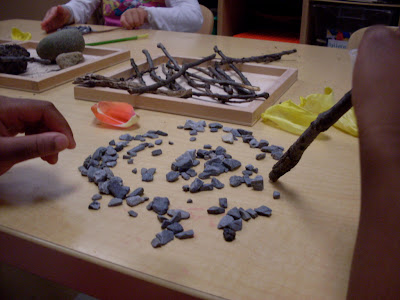Teachers - like children and everyone else - feel the need to grow in their competences; they want to transform experiences into thoughts, thoughts into reflections, and reflections into new thoughts and new actions. They also feel a need to make predictions, to try things out, and then interpret them. The act of interpretation is most important. teachers must learn to interpret ongoing processes rather than wait to evaluate results. In the same way, their role as educators must include understanding children as producers, not as consumers. They must learn to teach nothing to children except what children can learn by themselves...They must enter the time frame of the children, whose interests emerge only in the course of activity or negotiations arising from that activity. They must realize how listening to children is both necessary and expedient.I have been thinking very much about materials, especially in regard to the thought "They must learn to teach nothing to children except what children can learn by themselves." When I see images of the focus, skill, and care that children of Reggio Emilia exude when sculpting, painting, and creating in general, I want to nurture the conditions to bring our children to that place as well. In the past I feel I have not taught enough skills for dealing with different mediums.

With clay, for example, I want to teach the skills needed to add, remove, and join clay with small groups. In the past I have provided input as needed when I felt a child could not progress without a helping hand.

It's a constant rethinking and reinterpreting how to best cultivate independence. I would be very grateful to hear from other Reggio inspired educators. Do you teach a particular skill only when it seems appropriate to scaffold? Or do you teach a particular skill, such as joining clay in a small group so children can later incorporate that skill independently? Really, I would love to hear ideas.

No comments:
Post a Comment